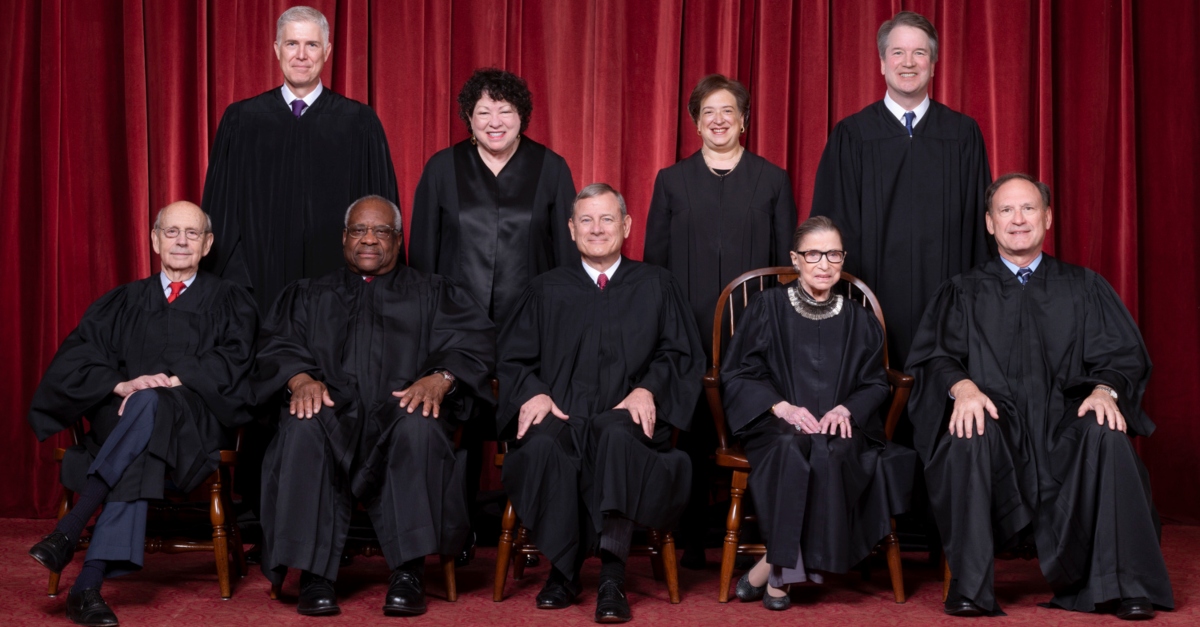
U.S. Supreme Court, clockwise from top left: Neil Gorsuch; Sonia Sotomayor; Elena Kagan; Brett Kavanaugh; Samuel Alito; Ruth Bader Ginsburg; John Roberts; Clarence Thomas; and Stephen Breyer.
The White House hasn’t gotten its way in recent Supreme Court cases, and no one seems to be more aware of that than President Donald Trump.
“Do you get the impression that the Supreme Court doesn’t like me?” he wrote in a tweet on Thursday morning in response to bad news for the administration on the immigration policy front. It was a curious thing to say since the high court has a 5-4 conservative majority, which the president achieved in his first term. Trump nominated Neil Gorsuch and Brett Kavanaugh.
One thing that is consistent about the 45th president is that he likes to stir the pot. It’s worth noting that two of the liberal justices–Ruth Bader Ginsburg and Stephen Breyer–are in their eighties. In other words, Trump’s comments on SCOTUS decisions can be viewed through the lens of SCOTUS’s larger importance to his 2020 re-election campaign. A sudden vacancy would certainly politically benefit the president who is in the position to replace them. Another term means potential to shape the highest court in the land to the liking of the president and his base.
“These horrible & politically charged decisions coming out of the Supreme Court are shotgun blasts into the face of people that are proud to call themselves Republicans or Conservatives,” the president wrote Thursday morning. “We need more Justices or we will lose our 2nd. Amendment & everything else. Vote Trump 2020!”
The justices on Monday handed the administration a loss when it ruled, in a 6-3 decision, that employers violate the Civil Rights Act of 1964 if they fire someone for either being “homosexual or transgender.” Gorsuch, a justice Trump handpicked, penned the majority opinion.
“The answer is clear,” Gorush wrote. “An employer who fires an individual for being homosexual or transgender fires that person for traits or actions it would not have questioned in members of a different sex. Sex plays a necessary and undisguisable role in the decision, exactly what Title VII forbids.”
The four liberals and conservative Chief Justice John Roberts (a George W. Bush nominee) joined his opinion. Kavanaugh dissented, as did remaining conservative justices Samuel Alito and Clarence Thomas.
The court also declined to hear arguments challenging “sanctuary city” laws in California. This was a de facto victory for certain undocumented immigrants and their supporters because it left in place a lower court decision protecting laws that restricted how state officials could cooperate with federal immigration enforcement authorities. Only Alito and Thomas voted in favor of hearing the case.
The Trump administration on Thursday also lost their bid to rescind the Deferred Action for Childhood Arrivals program (DACA), in a majority opinion authored by Roberts. Justices responded all over the place in what was functionally a 5-4 decision. Liberal Sonia Sotomayor, Thomas, Alito, and Kavanaugh each filed opinions both concurring and dissenting in part. If there’s a silver lining for the White House, it’s that Roberts only shot them down on procedural grounds.
“The dispute before the Court is not whether DHS may rescind DACA. All parties agree that it may,” he wrote. “The dispute is instead primarily about the procedure the agency followed in doing so.”
From Professor Steve Vladeck of the University of Texas School of Law:
It’s not that Chief Justice Roberts is a closet progressive. He’s not.
It’s that the Trump administration is *really bad* at administrative law.
— Steve Vladeck (@steve_vladeck) June 18, 2020
Former Obama-era acting U.S. Solicitor General Neal Katyal took issue with a report that a Trump ally claimed these DACA and LGBTQ losses were good for the president. The legal expert argued a “halfway competent” president would’ve likely won those cases.
This is even more deranged from reality than usual Trump nonsense. Trump ended DACA. He sent his top lawyer in to SCOTUS to end DACA. He lost, even w/all the deference Presidents get. Just like with the census citizenship case, halfway competent POTUS probably could have done it https://t.co/4UbOsSHqvS
— Neal Katyal (@neal_katyal) June 18, 2020
Colin Kalmbacher and Jerry Lambe contributed to this report.
[Image via U.S. Supreme Court]